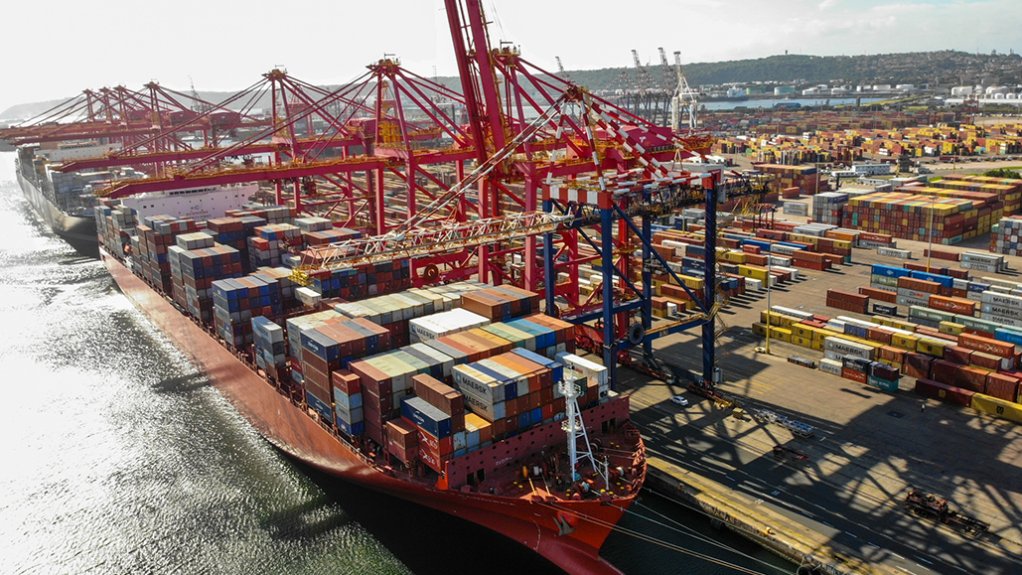TPT to continue to invest in Durban Pier 2 while legal spat over private partner plays out
South Africa’s Transnet Port Terminals (TPT) says it will continue to invest in Durban Container Terminal (DCT) Pier 2 while legal proceedings play out around its selection of International Container Terminal Services (ICTSI), of the Philippines, for a 25-year partnership at what is South Africa’s largest container terminal.
Rival bidder AP Moller–Maersk, of Denmark, is contesting Transnet’s selection of ICTSI, which was made in July last year, calling the award unlawful and invalid.
At a presentation to industry stakeholders in Umhlanga, KwaZulu-Natal, Transnet CEO Michelle Phillips confirmed that no date had yet been set for the hearing and described as a “worst-case scenario” one whereby the court set aside the award and ordered the State-owned entity to resume the bidding process afresh.
She indicated that such an outcome could potentially delay what is currently regarded as Transnet’s flagship private sector participation (PSP) project by up to two years.
Phillips defended both the process run by Transnet as well as the award to ICTSI, saying that “as far as we are concerned the process was run in accordance with our rules” and the qualifying criteria were met.
It has been reported, however, that AP Moller–Maersk will argue that, unlike its APM Terminals, which also bid, ICTSI fell short of a solvency requirement in the tender. For its part, ICTSI, which operates container terminals in 19 countries, insists it is fully able to fund the deal off its own balance sheet.
Speaking during the same Transport Forum event, TPT CEO Jabu Mdaki acknowledged concerns that Transnet would hold back on crucial investments at DCT Pier 2 until a partner was in place.
The terminal has the installed capacity to handle two-million twenty-foot equivalent units (TEUs) yearly, but has been underperforming against that nameplate.
TPT, Mdaki insisted, was fully aware that the terminal faced equipment challenges and he reported that orders were still being placed for major equipment at the terminal and that it would continue to do so until there was legal certainty.
“We’ve just issued a letter of award for four ship-to-shore cranes that we require at the terminal,” he reported, noting that it would take 18 to 24 months before the new cranes would be delivered.
“The reason for that is simple: we don’t know what the outcome of the court challenge will be,” Mdaki explained, adding that TPT had to act given that many of its cranes were operating beyond their useful lifespans and given the potential for the court action to lead to a protracted delay in completing the transaction.
TPT had secured the cranes under its recently introduced partnering strategy with original equipment manufacturers (OEMs) for various pieces of equipment, in this case with Liebherr. Mdaki said that absent the OEM framework, the delay in securing a manufacturing slot at Liebherr could have been up to 48 months in light of current market demand.
The decision to proceed was also premised on the fact that the cranes could potentially be used at other TPT terminals should the eventual DCT Pier 2 partner have an alternative approach to equipment.
“Should the successful bidder say they do not require these cranes and they are going to bring in their own equipment, we are able to redirect that equipment to our other terminals.
“If they do take them and they become part of the transaction, there is a mechanism, over-and-above the offer they have made as part of the transaction, for us to recover the funds.”
Likewise, TPT was preparing to procure straddle carriers for landside operations also using its OEM strategy.
“So we are not sitting back and saying everything will only happen once the PSP partner comes in,” Mdaki stressed.
Despite the PSP setback, TPT has set a target to handle 4.4-million TEUs in 2024/25 (including over 2.6-million TEUs across the container terminals at Durban), having handled 4.18-million TEUs last year; a year in which the Port of Durban, in particular, experienced extreme congestion from September, which was cleared only during the first quarter of 2024.
Article Enquiry
Email Article
Save Article
Feedback
To advertise email advertising@creamermedia.co.za or click here
Press Office
Announcements
What's On
Subscribe to improve your user experience...
Option 1 (equivalent of R125 a month):
Receive a weekly copy of Creamer Media's Engineering News & Mining Weekly magazine
(print copy for those in South Africa and e-magazine for those outside of South Africa)
Receive daily email newsletters
Access to full search results
Access archive of magazine back copies
Access to Projects in Progress
Access to ONE Research Report of your choice in PDF format
Option 2 (equivalent of R375 a month):
All benefits from Option 1
PLUS
Access to Creamer Media's Research Channel Africa for ALL Research Reports, in PDF format, on various industrial and mining sectors
including Electricity; Water; Energy Transition; Hydrogen; Roads, Rail and Ports; Coal; Gold; Platinum; Battery Metals; etc.
Already a subscriber?
Forgotten your password?
Receive weekly copy of Creamer Media's Engineering News & Mining Weekly magazine (print copy for those in South Africa and e-magazine for those outside of South Africa)
➕
Recieve daily email newsletters
➕
Access to full search results
➕
Access archive of magazine back copies
➕
Access to Projects in Progress
➕
Access to ONE Research Report of your choice in PDF format
RESEARCH CHANNEL AFRICA
R4500 (equivalent of R375 a month)
SUBSCRIBEAll benefits from Option 1
➕
Access to Creamer Media's Research Channel Africa for ALL Research Reports on various industrial and mining sectors, in PDF format, including on:
Electricity
➕
Water
➕
Energy Transition
➕
Hydrogen
➕
Roads, Rail and Ports
➕
Coal
➕
Gold
➕
Platinum
➕
Battery Metals
➕
etc.
Receive all benefits from Option 1 or Option 2 delivered to numerous people at your company
➕
Multiple User names and Passwords for simultaneous log-ins
➕
Intranet integration access to all in your organisation



















